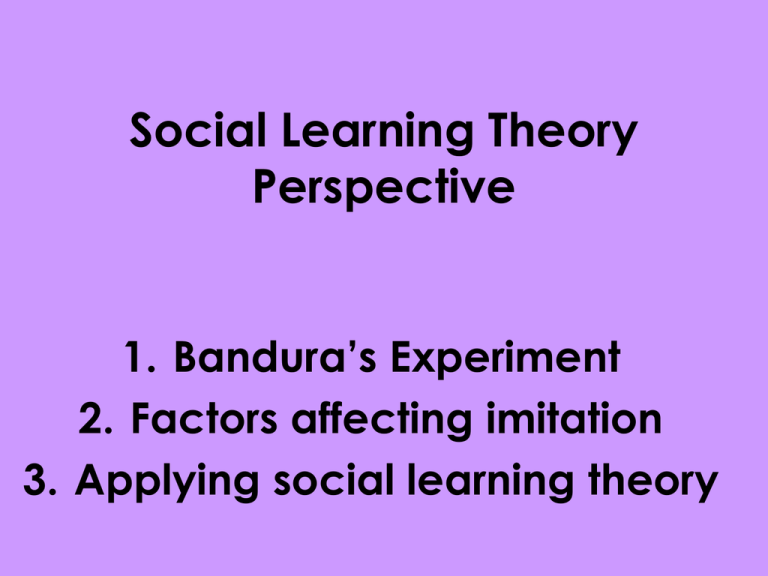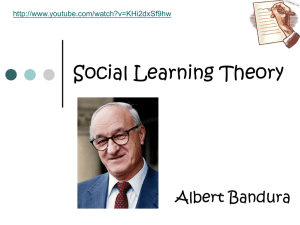Social Learning Theory Perspective
advertisement

Social Learning Theory Perspective 1. Bandura’s Experiment 2. Factors affecting imitation 3. Applying social learning theory Social Learning Theory Talk to the people next to you to discuss what you think SOCIAL LEARNING THEORY means. How does it explain human behaviour? Social Learning Theory Bandura’s Bobo Doll Experiment Bandura’s experiment claims that children learn behaviour from imitating others, especially significant people, people they admired, and people who they perceived were rewarded for behaviour. Read PP03 for experiment details and search on youtube for footage of the experiment. Social Learning Theory For learning to take place 5 factors must exist: 1.Availability 2.Attention 3.Retention 4.Reproduction 5.Motivation Social Learning Theory Availability 1) Availability - the behaviour to be learnt must be available. This means it must be performed somewhere for the individual to see. Where do you think behaviour can be learnt from? Where is behaviour seen by children? Social Learning Theory Attention 2)Attention We must notice the behaviour or we will not be able to learn it. The amount of attention we pay is influenced by the characteristics of the model. If the model is attractive, prestigious or powerful we are more likely to pay attention that if the model is unattractive, of low status and with little power. Discuss what will influence whether a child pays attention or not to a model. Social Learning Theory Attention (continued) 2) Attention (Continued) Click each of the buttons Chris Tarrant 1 2 3 Why do you think Chris Tarrant and other celebrities were used in these adverts? Social Learning Theory Retention 3) Retention The behaviour must be retained, ie the individual must be old enough or interested enough to be capable of keeping information about this behaviour in their memory. What examples can you think of where a child will not be able to keep behaviour in their memory? Social Learning Theory Reproduction 4) Reproduction the individual must be capable of actually performing the behaviour In small groups, list behaviours that different aged children will and will not be able to reproduce. (Age 3, 5, 7, 9, 11, 13, 15, and 17) You Tube Link The toddler does not have the skills to reproduce the dance moves, but she has a go! Social Learning Theory Motivation 5) Motivation Children may have learnt the behaviour and are able to reproduce it, but that does not mean that they will. They need to be MOTIVATED to imitate the behaviour. When might children be motivated to imitate behaviour? When might they NOT be motivated to imitate behaviour? Social Learning Theory Watch and Use PP04 to discuss and apply social learning theory to these video clips. Please answer all the questions on the handout. Social Learning Theory In groups of 3 or 4, create a poster to answer one of the following and present your work to your peers: 1.Explain how nursery workers could use social learning theory to teach the children to be nondiscriminatory. 2.Research a celebrity who has engaged in negative health behaviour (eg illegal drug use etc). Explain the implications of this to young people and children according to social learning theory. (Don’t forget to use the 5 factors which effect imitation) 3.Explain why positive role models should be used in health promotion campaigns.




